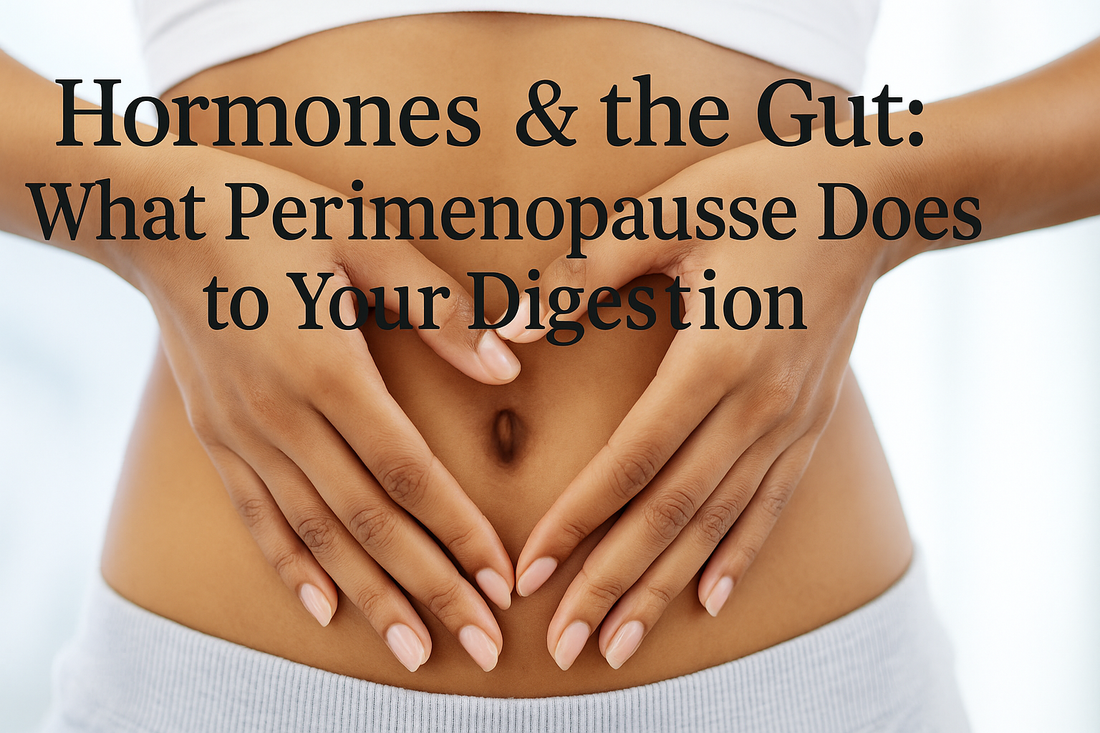
Hormones & the Gut: What Perimenopause Does to Your Digestion
Share
If you're in perimenopause (or its getting ever closer) and suddenly feeling bloated, constipated, or just off in your digestion, you're not imagining it. Hormonal shifts during this transitional phase don’t just impact your sleep and mood—they can profoundly affect your gut health too.
Many women notice changes in how they digest food, new food sensitivities, or gut symptoms that seem to appear out of nowhere. Let’s break down why this happens and what you can do to support your digestive health during perimenopause.
The Gut-Hormone Connection
Your gut and hormones are in constant communication. The balance of estrogen, progesterone, and cortisol influences everything from how fast your food moves through the digestive tract to which bacteria thrive in your microbiome. When these hormones start to fluctuate (and eventually decline) in perimenopause, your gut can feel the impact.
1. Estrogen: A Guardian of Gut Health
Estrogen plays a protective role in the gut. It supports the strength of your intestinal lining, promotes microbial diversity, and helps regulate inflammation.
During perimenopause, as estrogen levels start to drop:
-
The gut lining can become more permeable, increasing the risk of what’s often called "leaky gut." This may contribute to food sensitivities or systemic inflammation.
-
A special group of gut bacteria known as the estrobolome helps process and recycle estrogen. When estrogen levels drop, the balance of these bacteria can shift, affecting hormone regulation and digestive comfort.
-
Bile production may decrease, making fat digestion more difficult, and leading to symptoms like bloating or sluggish digestion.
2. Progesterone & Gut Motility
Progesterone helps keep things moving smoothly through the digestive tract by relaxing smooth muscle.
In perimenopause, lower or fluctuating progesterone can result in:
-
Slower gut transit time, which often shows up as bloating or constipation.
-
Some women also experience alternating diarrhea and constipation, particularly if they’re sensitive to progesterone fluctuations during their cycle.
3. Cortisol, Stress & the Gut-Brain Axis
Perimenopause often brings increased stress, whether from disrupted sleep, anxiety, or simply the demands of midlife. This ramps up cortisol, your body’s primary stress hormone, which has a direct impact on your gut:
-
Cortisol reduces digestive enzyme production, which can lead to indigestion, nutrient malabsorption, and bloating.
-
Chronic stress alters gut motility and microbiome balance, sometimes triggering IBS-like symptoms.
-
The gut-brain connection becomes more reactive, meaning stress can directly manifest as gut discomfort—and gut issues can worsen anxiety and mood swings in return.
4. Gut Microbiome Changes
Your gut bacteria aren’t immune to hormonal shifts. As estrogen and progesterone levels drop, microbial diversity often decreases, leaving room for less beneficial (and more inflammatory) bacteria to flourish.
This can result in:
-
Weaker immune resilience
-
More frequent bloating or food intolerances
-
Worsened brain fog, anxiety, or mood swings (since your gut produces many key neurotransmitters like serotonin)
5. Nutrient Absorption Takes a Hit
Hormonal changes, stress, and digestive slow-downs can reduce your ability to absorb vital nutrients. During perimenopause, this can mean deficiencies in:
-
Magnesium – critical for relaxation, sleep, and hormone metabolism
-
B vitamins – key for energy, mood, and nervous system health
-
Zinc – essential for immune function and gut repair
Without enough of these, perimenopausal symptoms can intensify.
Supporting Your Gut Through Perimenopause
The good news? You can take practical, supportive steps to improve gut health and feel better in your body.
Here’s where to start:
-
Eat a diverse, fiber-rich diet: Include a wide variety of colorful vegetables, legumes, and whole foods to feed your beneficial gut bacteria. Add fermented foods like kimchi, sauerkraut, or kefir for natural probiotics.
-
Get regular movement: Gentle, consistent exercise supports motility and reduces stress.
-
Prioritize stress management: Breathwork, meditation, journaling, or walking outside can lower cortisol and benefit your gut-brain connection.
-
Try digestive support: Some women benefit from digestive enzymes, magnesium citrate, or probiotic supplements—especially during times of intense hormone change.
-
Balance your hormones: If gut issues are persistent or worsening, consider talking to a menopause specialist. Hormonal support, including MHT/HRT, can improve both digestion and quality of life.
Final Thoughts
Perimenopause may bring surprises, but gut discomfort doesn’t have to be one of them. If you’re bloated, irregular, or just feeling disconnected from your digestion, know that it’s not just in your head—it’s in your hormones. With some adjustments to diet, stress levels, and possibly hormonal support, your gut can be a strong, steady ally through midlife and beyond.
You deserve to feel good in your body—every part of it.
